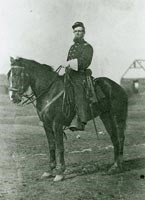
July 6, 2020
Disclaimer: This article includes inappropriate language as used in historical context.
The root cause that looms over the titanic conflict that was the Civil War (1861-1865) is the institution of slavery in America. Since the first enslaved African was offloaded in Jamestown (1619), through the struggle for Independence, and amidst the growing pains of a new nation, forced labor was at the heart of the country’s systems of production. The proliferation or limitation of slave labor defined the politics and delineated sectional boundary lines within the country, a festering issue eating away at the foundations of national unity.
On the eve of that great American crisis, 15 of 34 states in the United States permitted slavery within their borders. Delaware, the first state to officially enter the Union, was a border state and arguably the last to retain the “peculiar institution.” Although the 13th Amendment officially abolished slavery in December 1865, Delaware would not ratify it until doing so symbolically in February 1901—36 years later. It is ironic, then, that Delaware also produced the first casualty of the Civil War, a Black man in a blue uniform who was blooded in defense of that Union.
Nicholas “Nick” Biddle’s earliest years are shrouded in mystery. This is largely due to a scarcity of documentary evidence, a sadly common obstacle to sharing African American stories and perspectives. In fact, were it not for the notoriety he gained in the first days of the American Civil War, it’s likely his story too would have faded into the mists of the past entirely.

Image Courtesy: Delaware Public Archives
Nicholas Biddle, in fact, is not the name that he had at birth. He was born and enslaved in Delaware sometime in 1795 or 1796. The determination to shape his own future must have burned in him, however, because at an unknown point between then and January 1840, the man who would take the name “Biddle” carried himself away to freedom.
The route that Biddle took to his new life as a free man is just as unknown as his birth name, but a prominent route of the Underground Railroad through Delaware did begin to emerge in the 1820s. Known havens for Freedom Seekers are recorded in Camden, Middletown, and Odessa, with Wilmington being the hub of this network and directed by the noted abolitionist Thomas Garrett. Perhaps it was this relay of safe houses that ferried him to freedom, or perhaps he was one of those who risked retrieval by boat from a remote, unoccupied stretch of Delmarva beach in the dead of night. Whichever the case may be, he ended his journey and settled in Pottsville, PA.

Image Courtesy: Philadelphia and its Environs, and the Railroad Scenery of Pennsylvania (1875)
Whether he settled in Pottsville directly or arrived there via Philadelphia is uncertain, but he did take his name from noted Philadelphia financier and President of the Second Bank of the United States, Nicholas Biddle. Some stories allege that, upon his supposed arrival in Philadelphia, the Freedom Seeker found work in the financier Biddle’s household and adopted his employer’s name as his own out of gratitude. Other versions maintain that he encountered the financier while working as a porter at the Mansion House Hotel in Pottsville during a party hosted there in January 1840. The two stories agree, however, that after that event, Nicholas Biddle—most often known simply as “Nick”—was a fixture of the Pottsville community, working odd jobs, selling oysters and ice cream, and living in a modest home on Minersville St.
In particular, Nick Biddle took a keen interest in the local militia company, the Pottsville Blues, which renamed itself the Washington Artillery Company in 1842. Biddle quickly befriended its members and, even though it was illegal for a Black man to join military organizations at the time, the part-time soldiers gave him a uniform and unofficially adopted him as one of their own.

Image Courtesy: State Museum of Pennsylvania
When the Secession Crisis began in December of 1860, the Pottsville militia companies and those of the surrounding Schuylkill County region were an aberration for their time, being frequently- and well-drilled. They were also eager to serve, offering to travel to Washington D.C. in defense of the capital on April 11, 1861—the day before the Confederates fired on Fort Sumter in South Carolina. With the city defenseless, their offer was swiftly accepted. The five militia companies, including Biddle and the Washington Artillery, departed for Harrisburg to be taken into Federal service. The local Miners’ Journal recalled the scene:
As the companies proceeded down Centre street, to the depot of the Philadelphia and Reading Railroad, they were greeted with cheers from the thousands who lined each side of the street, and a perfect ocean of handkerchiefs waved by the ladies, who had taken possession of all the windows, and every available situation along the street. All the stores were closed and business entirely suspended. At the depot the crowd was immense, and it was almost impossible to force your way through it. The tops of the passenger and freight cars, the roofs of the depot and neighboring houses, were black with spectators. Never had so great a concourse assembled on any one occasion before in Pottsville.
The men arrived in Harrisburg, PA, and were swiftly sworn into Federal service—all of them except, of course, Nick Biddle. It was not yet legal for African Americans to serve in the U.S. Army, so Biddle remained with his fellows as a volunteer orderly (assistant) to one of the officers: his friend, Captain James Wren. The men were then almost immediately hustled back aboard trains bound for the beleaguered Washington, traveling via Baltimore, to become the city’s “First Defenders.”

Image Courtesy: Public Domain (Harper’s Weekly, 1862)
There was no direct route from Harrisburg to Washington in 1861 and passengers were required to switch rail lines in Baltimore for the final leg of the journey. At any other time, having to route through Baltimore wouldn’t qualify as much more than a minor inconvenience; on April 18, 1861, however, it was a much different matter. Baltimore was a preeminent maritime city and had a rough-and-tumble reputation to match. What’s more, the city was known to have significant population of pro-Southern sympathizers. Just two months earlier, rumors of an assassination plot necessitated that President-elect Abraham Lincoln sneak through Baltimore by night in order to take up his Constitutionally-mandated office. Now, Nick Biddle and the First Defenders were riding the rails right into a powder keg ready to burst.
Upon learning that pro-Union troops were due to arrive in the city, nearly 2,000 Confederate sympathizers gathered to confront them, wielding clubs and makeshift weapons in addition to their vitriol. The Pennsylvanians, outnumbered four-to-one, were mostly unarmed: they had been promised that good muskets were waiting for them in Washington. Fifty soldiers of the Regular Army were also aboard the train under orders to garrison Fort McHenry by the harbor, but that meant they could only escort the fresh volunteers part-way. Once the Regulars diverged, the Baltimore Police Department was to step in and see the First Defenders to their destination at the Camden station, where a second train awaited to take them to the capital. To get there, Biddle and his comrades would have to cross two miles of hostile streets.
As Biddle and his friends stepped down from their train, it was immediately obvious that the long walk across the city to the Camden station was going to be a perilous one. Before long, the Regulars departed and the members of the Baltimore Police deployed to hold back the mob proved ineffective: surges would break through the cordon, landing flurries of blows, spitting on the troops, and decrying them as “damned Black abolitionists.” As Camden station appeared in sight ahead, the crowd’s fury intensified and the police line began to dissolve.

Image Courtesy: Public Domain (Harper’s Weekly, 1862)
Bricks, stones, and bottles flew through the air, pelting down among the Pennsylvanians. The sight of 65-year-old Nick Biddle in his uniform seemed to especially provoke the crowd. Captain James Wren, the friend who had accepted Biddle as his volunteer orderly, recalled that the mob targeted Biddle specifically, hurling projectiles and ugly racial slurs at him. There was nothing to be done, Wren lamented, commenting that, “poor old Nick had to take it.” Biddle was struck repeatedly. One brick hit him in the forehead, causing a grievous injury that cut deep enough to expose bone. Blood coursed down his face. With this wound, many historians believe that the Delaware-born Nick Biddle was the first man to shed blood in conflict with Confederates, making him the Civil War’s first casualty.
Several other soldiers suffered broken bones or were knocked unconscious as they scrambled aboard the train cars, uncomfortable freight wagons with the unforeseen benefit of being sturdily built and without windows—providing much-needed protection from the howling mob outside, the boldest of whom actually clambered up and tried to break in. Biddle wrapped his head with a handkerchief and pulled his cap down over the injury as the train pulled away. The shaken First Defenders rode in silence to Washington. Their first taste of soldiering had been a sour one.

Image Courtesy: US Army Military History Institute
As the first soldiers to arrive in Washington, the troops were quartered in public buildings all over the city. Biddle and the Washington Artillery were put up in the capitol building itself. Veterans later recalled that, as Biddle looked up at the looming unfinished dome from the rotunda, he took his cap and handkerchief from his head. Droplets of blood sprinkled the fine marble floor.
Early the following morning, a lean and lanky figure appeared among the exhausted men: Abraham Lincoln had come to offer up his thanks to the men in person. The First Defenders called upon him for a speech, to which Lincoln instead replied, “I did not come here to make a speech. The time for speechmaking has gone by, the time for action is at hand. I have come here to give you a warm welcome to the city of Washington and shake hands with every officer and soldier in your company providing you grant me the privilege.” No one denied him.
Lincoln commiserated in particular with the bruised and battered, but came up short in surprise at the sight of a formerly enslaved man in military uniform, the wound on his head wrapped in bandages stained red. The President urged Biddle to go and seek treatment for his injuries, but he declined and restated his determination to remain with his comrades.

Image Courtesy: Library of Congress
The First Defenders served out their initial 90 days of service, primarily in Washington, before returning home. When the Washington Artillery returned to Pottsville and paraded through town, Biddle was at the front of the column. Most of those men promptly reenlisted for three more years in the 48th Pennsylvania Volunteer Infantry. The majority ended up in Company B, led by Captain Wren. For Nick Biddle, however, the war was over. Bearing the scar and showing his age, he remained at home while his comrades served faithfully throughout the war.
Back in Pottsville, Nick Biddle carried on much as he had before his moment of destiny that April day in Baltimore. He donned his uniform just one more time in 1864 to have his image struck by a local photographer. That image, the one seen above, was copied hundreds of times and sold at the Great Central Fair in Philadelphia to raise money to raise money for soldiers’ relief. He was compared by others at the event to Crispus Attucks, a man of African and Native American descent who was first to be slain at the Boston Massacre in 1770. Biddle himself never made this comparison, but his likeness became a local staple: “a photographic album is not considered complete in Pottsville without the picture of the man whose blood was first spilled in the beginning of the war,” one of Biddle’s comrades remembered later in life.

Image Courtesy: New York Military History Museum
After the war, Biddle fell on hard times. He suffered from rheumatism and a variety of other maladies that sapped his strength and modest savings. He was forced to turn to charity from his Pottsville neighbors. The local newspaper, The Miners’ Journal appealed to the community for help:
If poor old Nick Biddle calls on you with a document, as he calls it, don’t say you are in a hurry and turn him off, but ornament the paper with your signature and plant a good round sum opposite your name. Nick has been a good soldier and now that he is getting old and feeble, he deserves the support of our citizens.
Nick Biddle died at his home on August 2, 1876. He was approximately 80 years old. At the time of his death, Biddle was destitute, with no money available to go towards a proper burial. He seemed bound for an unmarked potter’s burial when his old First Defender comrades came to the rescue: all of the survivors pitched in a dollar for his funeral and interment. They formed a solemn processional down the street to the burying ground, heads low as drums rumbled out the mournful cadence. Wearing their old uniforms, the men of the Washington Artillery placed a floral cross upon his breast and lowered his simple coffin into the ground. Over the grave sat a headstone, also paid for by the First Defenders. It read:
In Memory of Nicholas Biddle, Died August 2, 1876, Aged 80 Years. His Was the Proud Distinction of Shedding the First Blood In the Late War For the Union, Being Wounded While Marching Through Baltimore With the First Volunteers From Schuylkill County 18 April 1861. Erected By His Friends In Pottsville.

Image Courtesy: Collection of John David Hoptak
Through the years, time forgot Nick Biddle. His tombstone was broken by vandals while his saga, and that of the First Defenders, were overshadowed by later events. Pottsville, however, remained proud of its Civil War contributions and dedicated a monument in Garfield Square on the 90th Anniversary of the riot in Baltimore in 1951.

Image Courtesy: Deborah Nouzovski (findagrave.com)
As for Biddle himself, he never made much of his service or place in history. When pressed about the events in Baltimore in his later years, he was often heard to remark, “that he would go through the infernal regions with the [Washington] artillery, but would never again go through Baltimore.”
The life of Nicholas “Nick” Biddle is that of someone no less remarkable than many better remembered in history. It’s the story of a man born and enslaved in Delaware, who had the courage to seize his own freedom, had the will to make a place for himself as a free man of color in an unaccepting world, whose loyalty to country and comrades carried him where no oath bound him to be, and whose character inspired such affection and devotion from his friends to the end. It’s an epitaph anyone could be proud of.
In spite of the wrath of time, Nick Biddle’s story remains one worth telling.

Image Courtesy: John David Hoptak
________
Acknowledgement: A special note of thanks must be extended to John David Hoptak, an NPS Park Ranger at Antietam National Battlefield, who conducted much pioneering research to rescue Nick Biddle’s life story from obscurity. Much of the above is the fruits of his extraordinary efforts.


